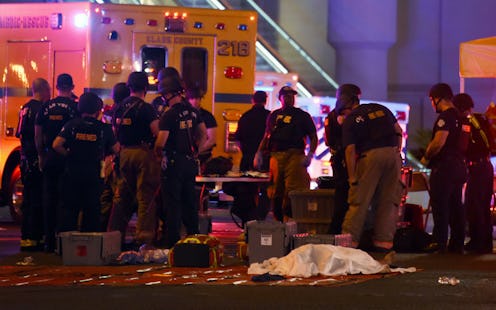News
Why This Sandy Hook Victim's Mother Blames Congress For The Las Vegas Shooting

After Sunday night's horrific mass shooting, a mother of one of the Sandy Hook victims said Congress is to blame for Las Vegas. Nelba Márquez-Greene lost her 6-year-old daughter, Ana Grace in December 2012, when a 20-year-old shooter opened fire at the Sandy Hook Elementary School before taking his own life. She later went on to establish The Ana Grace Project "to prevent violence and promote recovery." Márquez-Greene took to Twitter shortly after the Las Vegas attack to argue that the shootings have been directly caused by inaction, stressing that Congress's "lack of courage and/or ability to take meaningful action on issues that most matter" such as healthcare, violence and the climate "is outrageous."
To place the concerned citizen's claims in context, Nevada's gun laws are amongst the most permissive in the country, according to the BBC, which states it is legal there to carry an assault rifle and that there is no magazine capacity limit. Besides which, the BBC reports that no purchase permits or blue cards are required, and private gun sales are legal. Márquez-Greene was careful to stress that she was not blaming the media, only Congress for the attack that took place on Sunday October 1.
Following the attack on Sandy Hooks elementary school, Senator Dianne Feinstein attempted to introduce a variation on the Federal Assault Weapons Ban, a subsection of the Violent Crime Control and Law Enforcement Act of 1994 that made it illegal to "manufacture, transfer, or possess a semiautomatic assault weapon" and which automatically expired in 2004. Her version didn't expire after a decade and also closed the loophole "that legalized the slide iron stock," which, according to Mother Jones, allowed "gun-owners to convert their firearms into fully-automatics weapons — legally."
However, the Assault Weapons Ban 2013 was defeated in the Senate, with 60 senators voting against it. As such, it's easy to understand people's frustration with politicians surrounding the issue, with commentator for The Mail On Sunday Dan Hodges tweeting, "In retrospect Sandy Hook marked the end of the US gun control debate. Once America decided killing children was bearable, it was over." In response, Márquez-Greene tweeted the following.
However, despite the allusion to the NFL players protesting racial injustice, the mother was quick to stress that the pain of losing a child is the same no matter what the skin color of the perpetrator. But she also asked "how come we never talk about angry White men w/guns?"; presumably, this is a reference to what Bustle writer Jenny Hollander calls "tropes of the "lone wolf" and "'mentally disturbed individual'" being used to describe white American man who commit crimes while "'terrorist' is often used to describe non-white perpetrators, no matter the crime."
And the anti-gun violence activist also used the shooting to discuss the mental health trauma that comes with losing a child. She describes battling "grief related Anxiety, depression, PTSD daily," explains that she and her partner move forward for their son, and stressed that her own color or location shouldn't be used as an excuse for the pain of grief: "Gun violence and grief hurt in EVERY zip code. In every color."
Of course, 2013 wasn't the last time that Congress tried to pass more gun control legislation. Prior to the Las Vegas attack, a shooter killed 49 people inside Pulse, a gay nightclub in Orlando, something which CNN reported authorities had called "the nation's worst terror attack since 9/11." Following the nightclub shooting in Orlando, Florida, Obama urged Congress to pass measures to make buying weapons like the SIG Sauer MCX semi-automatic rifle used in the attack more difficult. However, The Independent later reported that Democrats in Florida had stated that almost every possible attempt to introduce gun control legislation following the attack had been blocked.
As the past attempts to introduce legislation have proved, it's difficult to get gun-control legislation passed, whether on a national or regional level. However, these tweets are a powerful reminder that it doesn't have to be like this and that a Congress who offer "thoughts and prayers" to the victims of massacre rather than concrete solutions to prevent such atrocities repeating in the future is woefully inadequate.
Here are some ways you can help the victims in Las Vegas.